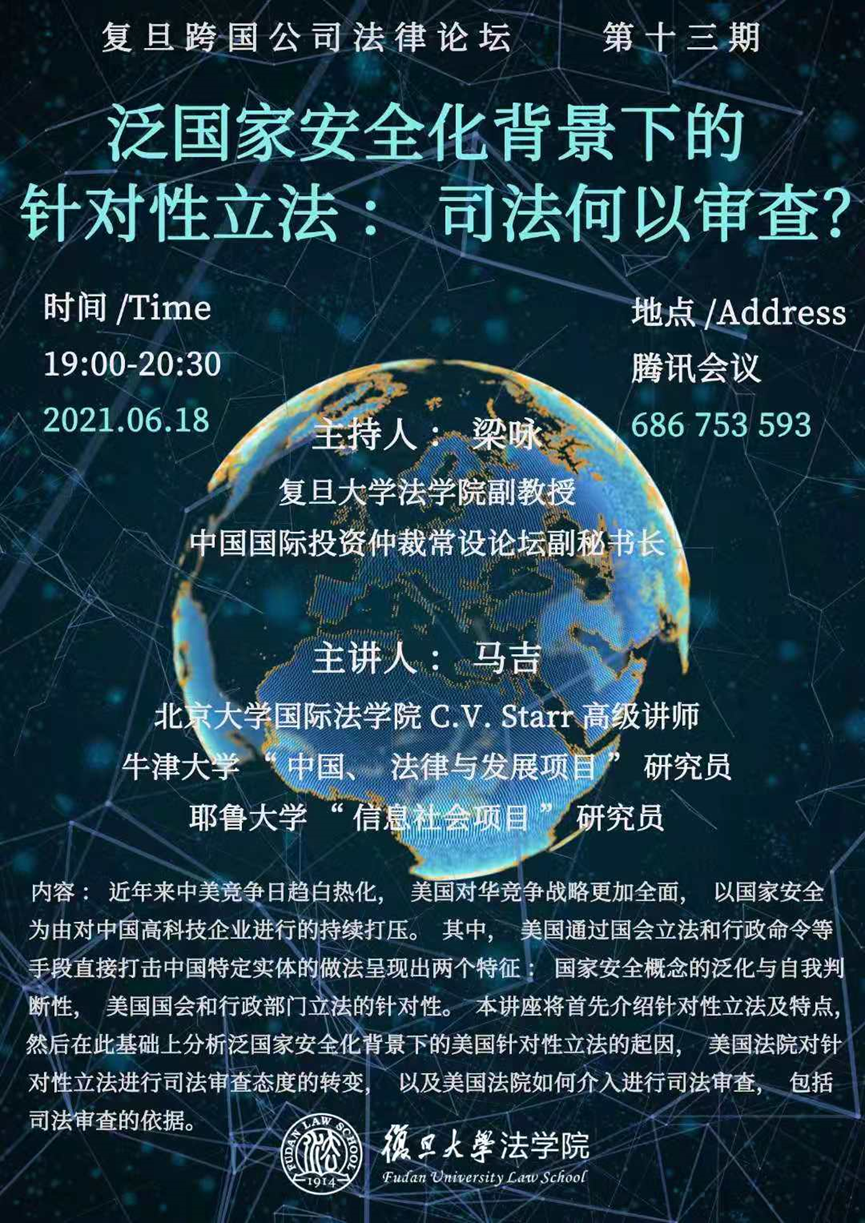
On June 18, 2021, the thirteenth keynote speech of the "Fudan Transnational Corporations and Law Forum" and the first episode of the third series "TNCs and Information Security" was held successfully online.Senior Lecturer MA Ji of Peking University School of Transnational Law delivered the speech titled "Targeted Legislation in the Context of Generalized National Security: When and How can Judicial Review Intervene?."
At the beginning of the lecture, Mr MA briefly introduced the background of the recently emerged state practice in targeted legislation under a generalized concept of "national security interests" to realize state interests that are conventionally not categorized as "national security interests," such as the competitive advantage of domestic corporations at home and abroad. Mr MA then clarified that this lecture focused on how Chinese corporations can utilize the United States (US) legal system to tackle the challenges arising from the US targeted legislations under a generalized scheme of national security interests amid the intensified competition between the US and China. He proceeded to introduce the US government institutions responsible for foreign investment review, their procedures, and the factors they consider when assessing threats to national security interests. Later, he used the cases of TikTok, Xiaomi, and Huawei to illustrate how the three Chinese corporations have used the US legal system to protect their interests. Tiktok and Xiaomi opted to file a claim based on the Administrative Procedure Act against the executive orders issued by responsible agencies of the US government, including the Committee on Foreign Investment and the Department of Defense. Both of them succeeded in obtaining a preliminary injunctive relief. Huawei sued Congress over the 2019 Federal Defense Authorization Act that restricted its ability to do business with federal agencies and their contracts and claimed that the act violated its constitutional rights under the doctrine of Separation of Powers and the Bill of Attainder. But Huawei lost its lawsuit and has appealed to the district court's decision. Mr MA observed that the US courts are inclined to defer to the government's judgment in reviewing actions of the US government involving national security interests, especially an act adopted by Congress. Therefore, he suggested Chinese corporations filing claims based on the Administrative Procedure Act rather than the Constitution in protecting their interests against the targeted actions of the US government.
The commentator of this lecture, Dr LU Pingxin of Fudan University Law School, explained the rationale behind the US court's deference approach in cases involving national security interests from the perspective of the development of the US constitutional and administrative law. Compared to sticking to litigation over a generalized concept of "national security interest," he suggested that Chinese corporations should look for "non-national security interests" grounds in the US sequence of constitutional values, whose hierarchy is higher in constitutional discourses, in order to reduce the interference of political considerations on judicial reviews by courts. Associate Professor LIANG Yong of Fudan University Law School had an in-depth discussion with Mr MA over the status of national security assessment in foreign investment review.
On June 25, 2021, the second episode of the third series "TNCs and Information Security," titled "How a Middle Platform Strategy Advances the Digital Transformation of Corporate Legal Affairs and Accelerates the Process of Elevating to the AI Track," would be delivered by Mr SHI Lei, General Counsel of Oppo Mobile Telecommunications Corp., Ltd.






